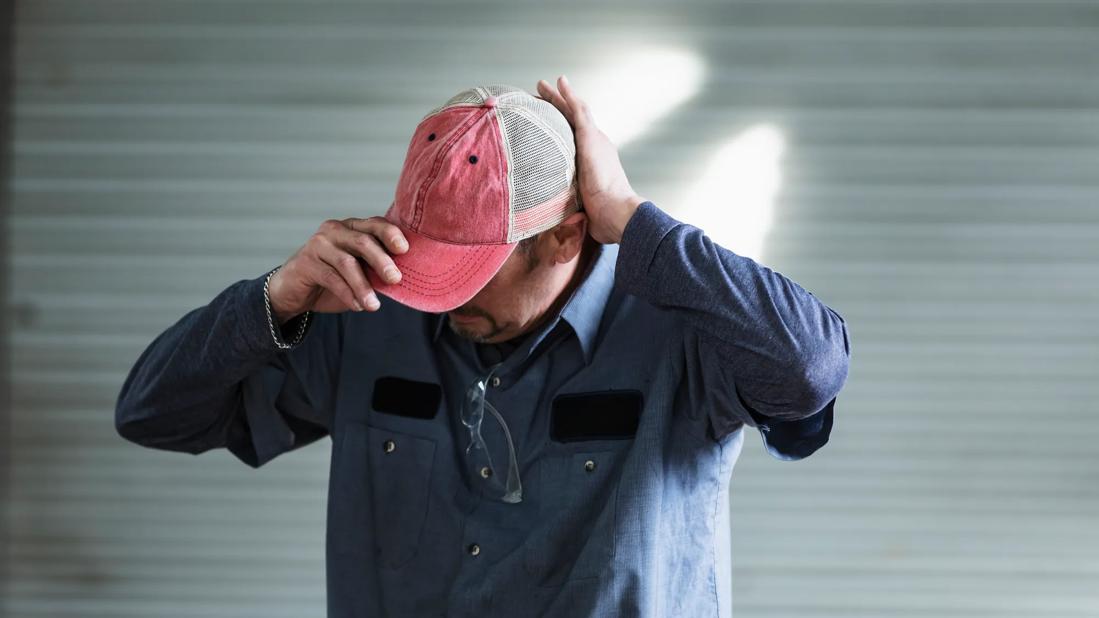Studies are mixed, but frequently wearing very tight, warm hats could stress your follicles and lead to hair loss

Image content: This image is available to view online.
View image online (https://assets.clevelandclinic.org/transform/0faae947-6bef-4cfa-9495-afd965ceec99/hat-1311546248)
Man putting on a red ball cap hat
Maybe you love your favorite baseball cap and are rarely seen without it. Maybe you cover your head for religious reasons, and you love a fashionable fedora atop your hijab. Or maybe you just like to add a little extra flare to your outfits with the occasional beanie or beret.
Advertisement
Cleveland Clinic is a non-profit academic medical center. Advertising on our site helps support our mission. We do not endorse non-Cleveland Clinic products or services. Policy
But could what you wear on your head impact whether hair can grow on it?
Whether you’re experiencing hair loss or concerned you might start to, dermatologist John Anthony, MD, is here to discuss the ways your headwear might contribute.
“This is a tough question to answer because the topic has not been well-studied,” Dr. Anthony acknowledges. “But most often quoted on this topic are two studies that looked at possible environmental factors for hair loss in pairs of male and female identical twins.”
In neither of these studies was the wearing of hats associated with worsening hair thinning. A study of 92 male identical twins found that men who wore a hat every day experienced less hair loss at the temples than their non-hat-wearing twins. On the other hand, a study of 98 identical female twins found that “absence of hat use” was associated with increased hair loss in women.
So, if hats don’t cause hair loss, what does? First, it’s important to know that there are different types of hair loss, and they have different underlying causes. Male pattern baldness and female pattern baldness, for example, are hereditary, while alopecia areata is an autoimmune disease.
But in general, hair loss is the result of a combination of factors, like:
Advertisement
While the science isn’t totally clear on whether hats contribute to hair loss, Dr. Anthony warns that there are some theoretical risks to wearing hats that are too tight or that cause your scalp to become itchy and inflamed afterward.
“We think it’s possible that wearing hats that are very tight or very hot could decrease blood flow to the hair follicles, stressing them or putting too much tension on them,” he says. “The hair loss would be temporary at first, but it could progress to permanent hair loss over time.”
You may also be at risk for hair loss if you’re in the habit of pulling your hair into a ponytail, braids or other tight styles to keep it neat and held back beneath a hat. But the risk doesn’t come from the hat itself.
This type of hair loss is called traction alopecia, and it’s the result of chronic (long-term or repeated) tension on your hair, which damages your hair follicles.
“If you’re already susceptible to hair loss, styles that pull tightly on your hair can stress the roots and lead to hair loss,” he adds.
Traction alopecia is most often seen in Black women, but it can happen to anyone. And you may be at higher risk for this type of hair loss if you frequently cover your hair in some form, like if you:
“If traction alopecia is caught early and you can remove the source of tension to your hair, your hair may start to grow back,” Dr. Anthony says.
This is still sometimes possible in the case of religious head coverings, like by changing the fabric of your hijab or changing the location of the hairpins you use to secure your kippah.
Wearing the occasional hat won’t contribute to hair loss, but it’s not clear whether frequent hat-wearing will.
“A loosely fitting option may be a safer bet than a tight-knit cap or tight baseball hat,” Dr. Anthony suggests. (Easy-breezy bucket hat, anybody?)
But if you have to wear a specific type of head covering every day, like for religious or work-related reasons, you may want to talk to a dermatologist about how to keep your hair as protected as possible in the long run.
Advertisement

Sign up for our Health Essentials emails for expert guidance on nutrition, fitness, sleep, skin care and more.
Learn more about our editorial process.
Advertisement
Take steps to reduce stress by practicing meditation, finding time to relax and maintaining a healthy lifestyle
You may see pitting, brittleness or ridges in your fingernails and toenails
Your immune system may attack hair follicles anywhere on your body
It’s normal to lose around 50 to 150 strands per day to routine hair shedding
Things like stress, heated styling and other health conditions may cause you to lose more hair than normal
Creatine does cause some side effects, but hair loss probably isn’t one of them
A gentle hair care routine, stress reduction and sun protection can help reduce flares and maintain your locks
Home remedies may help your hair, but don’t expect them to cure the autoimmune disease
Prioritize your health by managing stress, strengthening your social connections and getting quality sleep
Bolsters, blankets, pillows and blocks can offer extra support, stability and comfort
Allergies, postnasal drip, asthma or reflux could be to blame for a cough that won’t quit